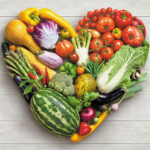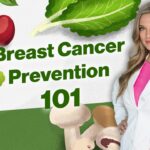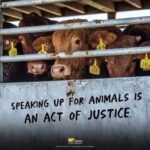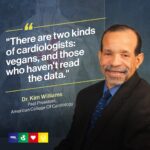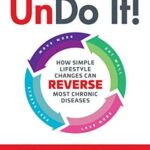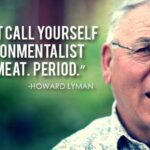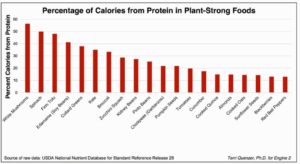Wow! Kudos to the American Journal of Cardiology for their proclamation that promoting plant-based nutrition is the moral imperative of the medical profession!
Now if we could just get most medical doctors to care enough to read the data themselves, and then share what they have learned with their patients. Please know that plant-based nutrition is the most powerful weapon we have to fight disease!
American Journal of Cardiology
“The typical Western diet, high in processed and animal-based foods, is nutritionally and ethically problematic. Beyond the well-documented cruelty to animals that characterizes the practices of the factory-farming industry, current patterns of meat consumption contribute to medical and moral harm in humans on both an individual level and a public health scale. We aim to deconstruct, by highlighting their fallacies, the common positive and normative arguments that are used to defend current nutritional patterns. Animal-based foods promote the mechanisms that underlie chronic cardiometabolic disease, whereas whole-food plant-based nutrition can reverse them. Factory farming of animals also contributes to climate change, antibiotic resistance, and the spread of infectious diseases. Finally, the current allocation of nutritional resources in the United States is unjust. A societal shift toward more whole-food plant-based patterns of eating stands to provide significant health benefits and ethical advantages, and the medical profession has a duty to advocate accordingly. Although it remains important for individuals to make better food choices to promote their own health, personal responsibility is predicated on sound advice and on resource equity, including the availability of healthy options. Nutrition equity is a moral imperative and should be a top priority in the promotion of public health.”
Click here for the published article.
I routinely give presentations on the power of plant-based nutrition, and I have noticed that it sometimes seems too good to be true for a few of the attendees. They rightfully ask why, if plant based diets can prevent and even reverse chronic disease, this information isn’t shouted from rooftops by medical doctors, healthcare professionals, and government officials? Well, firstly, and as usual, just follow the money. One of the big reasons why most doctors don’t prescribe plant-based diets is because most doctors don’t know anything about nutrition. Over 80% of medical schools in the United States don’t offer a single required course in nutrition. How so? There is zero financial incentive for the medical profession and the “healthcare” industry to share the scientific data of plant-based nutrition with students and the general population. Uncoincidentally, most doctors don’t prescribe a plant-based diet either for the very same reason (even though it is not just the only diet, but the only proven way to reverse heart disease, early stage prostate cancer, and type 2 diabetes). Plant-based diets are not profitable, and are therefore unjustifiable for industries/individuals who are most interested in maximizing profits. In the broken US “healthcare” system, healthy people are not good for business. As I have shared in other posts, if a doctor recommends a healthy vegan diet to his or her patients, it would mean fewer return visits, treatments, surgeries, hospital stays, and other medical procedures (the patient would also most likely have no need for medication, while her life expectancy would increase by about 12-14 years). In other words, the grotesque money train of our so-called healthcare system would come to a screeching halt, if people ate a plant-based diet and suddenly became healthy. And such a scenario of course, is completely unacceptable to our healthcare/sick-care industry, and those who make a fortune from our violent animal based food system, and the resulting management of disease approach (you gotta love capitalism!). But beyond that, I am also convinced that most medical doctors don’t care enough to do the right thing. I could be wrong but at this point, what is the excuse for medical professionals to continue to ignore the power of plant-based nutrition, or choose to remain ignorant on the subject? I still believe that most people are good, but when does the greed and insanity stop?
Dr. Sailesh Rao recently shared this observation on how the Vegan movement is trending in the right direction: “Rapidly unfolding events indicate that we have reached a breakthrough moment, if not a tipping point towards a Vegan World, and we have to seize it. Dr. Michael Greger points out that there were over 7000 scientific studies detailing the harm caused by cigarette smoking in the decades prior to the Surgeon General’s report in 1964 linking smoking to cancer. But it was the open acknowledgement by a public authority, the Surgeon General, that smoking is indeed bad for us, that tipped the scale on cigarette smoking among the general public. We are in a similar situation today with diet. We now have thousands of scientific studies pointing to the health and environmental efficacy of a diverse whole foods, plant-based vegan diet and the harmful effects of processed foods and animal foods. While it’s true that an attempt was made by Sen. George McGovern’s Senate Select Committee on Nutrition and Human Needs in 1977 to link diet with disease, that attempt was nullified by the animal agriculture industry through manufactured scientific uncertainties. The industry then proceeded to emasculate the Senate and moved all dietary recommendation responsibilities to the US Department of Agriculture, whose primary mandate is to help the animal agriculture industry grow. The animal agriculture industry now enjoys an estimated $414 billion in direct and indirect subsidies annually from the public sector in the US alone…”
Click here for Dr. Rao’s optimistic piece titled, “A Breakthrough Moment for the Vegan Movement.”
Click here for Dr. Michael Greger’s excellent 22+ minute video on why everyone should eat a plant-based diet.
Click here to learn more about the subsidies that are given to the meat, dairy, and egg industries without taxpayer consent.
Here are some of my “go to” game changing studies, data, and quotes on how plant-based diets are the most powerful weapon we have to fight disease, reduce animal suffering, promote peace, and heal our planet.
Harvard School of Public Health:
“Today, most medical schools in the United States teach less than 25 hours of nutrition over four years. The fact that less than 20 percent of medical schools have a single required course in nutrition, it’s a scandal. It’s outrageous. It’s obscene.”
Click here to learn more from the Harvard School of Public Health.
Healthy Living is the Best Revenge Study:
Plant-based diets are rarely recommended by doctors, as again, there is no financial incentive for them to prescribe healthy vegan diets. Studies show that a person who adopts a plant based diet (along with exercising, not smoking, and watching his or her weight) will reduce their chances of developing a chronic disease by close to 80%. Yes, 80%!
Click here for the Healthy Living is the Best Revenge Study.
Reversing Disease with Plant-Based Diets
I might reference this quote more than any other, and it is from the wonderful book, “Undo It!: How Simple Lifestyle Changes Can Reverse Most Chronic Diseases” by Dr. Dean Ornish and Anne Ornish:
“Here’s the bottom line: the only diet that has been scientifically proven to reverse heart disease, to slow, stop, or reverse early-stage prostate cancer, and to reverse aging by lengthening telomeres (among other benefits) is a whole-foods plant-based diet low in both fat and refined carbohydrates.”
Click here for a link to Dean & Anne Ornish’s superb book.
SUNY Downstate Health Sciences University:
“A plant-based diet emphasizes eating more plant-based foods (fruits, vegetables, grains, nuts, seeds,and legumes/beans) and fewer or no animal products (red meat, poultry, fish, eggs, and dairy). Plant-based diets can prevent, treat, and even reverse certain chronic diseases in adults that include high blood pressure (hypertension), heart (coronary artery) disease, type 2 diabetes (high blood sugar because your body does not use insulin properly), and high levels of lipids (fat, cholesterol, or triglycerides) in the blood. Adopting a plant-based diet can also lead to natural, and often sustained, weight loss among people who are overweight, obese, or who have a high body mass index.”
Click here to learn more about plant-based nutrition from SUNY Downstate Health Sciences University.
The Permanente Journal:
“The major benefits for patients who decide to start a plant-based diet are the possibility of reducing the number of medications they take to treat a variety of chronic conditions, lower body weight, decreased risk of cancer, and a reduction in their risk of death from ischemic heart disease. A plant-based diet is not an all-or-nothing program, but a way of life that is tailored to each individual. It may be especially beneficial for those with obesity, Type 2 diabetes, high blood pressure, lipid disorders, or cardiovascular disease. The benefits realized will be relative to the level of adherence and the amount of animal products consumed. Strict forms of plant-based diets with little or no animal products may be needed for individuals with inoperable or severe coronary artery disease.”
Click here for the article titled “Nutritional Update for Physicians: Plant-Based Diets.”
Position of the Academy of Nutrition and Dietetics:
“It is the position of the Academy of Nutrition and Dietetics that appropriately planned vegetarian, including vegan, diets are healthful, nutritionally adequate, and may provide health benefits for the prevention and treatment of certain diseases. These diets are appropriate for all stages of the life cycle, including pregnancy, lactation, infancy, childhood, adolescence, older adulthood, and for athletes. Plant-based diets are more environmentally sustainable than diets rich in animal products because they use fewer natural resources and are associated with much less environmental damage. Vegetarians and vegans are at reduced risk of certain health conditions, including ischemic heart disease, type 2 diabetes, hypertension, certain types of cancer, and obesity. Low intake of saturated fat and high intakes of vegetables, fruits, whole grains, legumes, soy products, nuts, and seeds (all rich in fiber and phytochemicals) are characteristics of vegetarian and vegan diets that produce lower total and low-density lipoprotein cholesterol levels and better serum glucose control. These factors contribute to reduction of chronic disease. Vegans need reliable sources of vitamin B-12, such as fortified foods or supplements.”
Click here for the published article from the Academy of Nutrition and Dietetics.
Heart Disease
“There are two kinds of cardiologists: vegans and those who haven’t read the data.”
– Dr. Kim Williams (cardiologist and former president of the American College of Cardiology)
Dr. Caldwell Esselstyn:
Dr. Esselstyn may be best known for his landmark clinical study of 198 patients with significant CAD (coronary artery disease). Of these patients, 119 had undergone a prior coronary intervention with stents or bypass surgery, and 44 had a previous heart attack. During the four years of follow up, 99.4% of the participants who adhered to a whole-food plant-based diet avoided any major cardiac event, including heart attack, stroke, and death, and angina improved or resolved in 93% (a 30-fold improvement from those who were treated conventionally). In other words, all of the patients who followed a whole food plant based diet experienced significant improvement, in some cases actual reversal of near end stage heart disease. So compelling is the evidence from his own studies and those of others that Dr. Esselstyn has called coronary artery disease a “toothless paper tiger, that need never exist, and where it does now, need never progress.”
Click here for a link to Dr. Esselstyn’s study “A Way to Reverse CAD?”
Click here for Dr. Esselstyn’s Three Case Reports Study.
The Journal of the American Medical Association (JAMA):
Associations of Dietary Cholesterol or Egg Consumption With Incident Cardiovascular Disease and Mortality
“Among US adults, higher consumption of dietary cholesterol or eggs was significantly associated with higher risk of incident CVD and all-cause mortality in a dose-response manner.”
Click here for the JAMA article on dietary cholesterol and egg consumption.
Dr. Kim Williams tells his patients that their food choices are determining everything. He then asks the following 4 questions for those who may still be struggling with converting to a plant-based diet:
1. How long do you want to live?
2. How much life do you want to have in the time that you have left?
3. How sick do you want to be?
4. Is there any food that tastes better than your health?
“And if they don’t respond to those, you know, the next time they come in, just be honest with them. You’re eating a standard American diet. In cardiology terms, that’s short-term revenue.” – Dr. Kim Williams (excerpt from an interview with John Robbins from the always excellent Food Revolution Network).
Type II Diabetes:
Dr. Neal Barnard (Physicians Committee for Responsible Medicine, PCRM):
“A plant-based diet is a powerful tool for preventing, managing, and even reversing type 2 diabetes. Not only is this the most delicious ‘prescription’ you can imagine, but it’s also easy to follow. Unlike other diets, there’s no calorie counting, no skimpy portions, and no carb counting. Plus, all the ‘side effects’ are good ones.”
Click here for yet another study that confirms that a whole food plant-based diet can reverse type 2 diabetes.
Click here to learn more about diabetes from the Physicians Committee for Responsible Medicine (PCRM).
Cancer:
The Journal of Urology (Dr. Dean Ornish):
“Increasing evidence from epidemiological and laboratory studies suggests that diet and lifestyle may have a role in the development of prostate cancer. The intake of total and specific vegetables, tomato products (lycopene), vitamin E, selenium, vitamin C and soy products has been inversely associated with prostate cancer risk. In addition, epidemio- logical evidence and migrant studies indicate that the incidence of clinically significant prostate cancer is much lower in parts of the world where people eat a predominantly low fat, plant based diet.”
Click here to learn more about plant-based diets and the prevention of prostate cancer.
Dr. T. Colin Campbell.
Click here for a clip on dairy, osteoporosis, and prostate cancer from the groundbreaking Forks Over Knives documentary.
Dr. Kristi Funk
Top 5 foods for fighting breast cancer:
1. Cruciferous Vegetables (broccoli, cauliflower, cabbage, kale, arugula, radishes, etc.)
2. Soy (organic or non-GMO)
3. Flaxseed
4. Berries
5. Allium vegetables (onions, chives, leeks, scallions, etc.)
Dr. Kristi Funk on breast cancer (excerpt from an interview with John Robbins of The Food Revolution Network):
“When you look at women diagnosed with breast cancer, literally only 5–10% of all women with breast cancer can point to an inherited genetic mutation as the major contributor to her cancer. In other words, as you pointed out, 87% of women don’t have a first-degree relative. About 80% of women with breast cancer don’t have any relatives with breast cancer.
“You know, on one end we’ve got genetics maybe contributing 5–10%. On the other end we’ve got maybe 5% tops of just inexplicable cancers, right? Fate, it doesn’t make any sense. But the big fat middle of our bell curve, amounting to 80–90% of all breast cancer, is under our control. And I get so brokenhearted when I get this backlash and I hear about it on social media or elsewhere. Like, are you saying that I caused my cancer? How dare you. You’re making this my fault? You’re shaming me? I’m going through this terrible time and now you’re telling me I did this to myself? And I have to say that it does break my heart because that’s not my intention at all to shame in any way. I find it actually quite the opposite, like, incredibly empowering. Would you rather it be truly up to fate and genetics? So it’s like, I guess I’ll just sit around for the next however long I have until it comes back and kills me.”
Click here for Dr. Kristi Funk’s superb book, Breasts: The Owner’s Manual.
COVID-19
British Medical Journal:
“In six countries, plant-based diets or pescatarian diets were associated with lower odds of moderate-to-severe COVID-19. These dietary patterns may be considered for protection against severe COVID-19…After adjusting for important confounders, participants who reported following ‘plant-based diets’ and ‘plant-based diets or pescatarian diets’ had 73%, and 59% lower odds of moderate-to-severe COVID-19 severity, respectively, compared with participants who did not follow these diets.”
Click here for the BMJ study on COVID-19.
Animal Welfare
Click here to learn more about compassionate living, and how adopting a vegan diet can save nearly 200 animals every year.
Click here for a 5 minute video on the dairy industry called Dairy is Scary.
Click here for the powerful documentary, Dominion.
Mother Earth
“We Americans are not usually thought to be a submissive people, but of course we are. Why else would we allow our country to be destroyed? Why else would we be rewarding its destroyers? Why else would we all, by proxies we have given to greedy corporations and corrupt politicians, be participating in its destruction? Most of us are still too sane to piss in our own cistern, but we allow others to do so, and we reward them for it. We reward them so well, in fact, that those who piss in our cistern are wealthier than the rest of us. How do we submit? By not being radical enough. Or by not being thorough enough, which is the same thing.”
– Wendell Berry
Click here to learn more about how avoiding meat and dairy products is the “single” biggest way to reduce your impact on Earth.
Click here to learn more about how “climate leaders” downplay animal agriculture and the food on their plates.
Click here to learn more from the United Nations on how plant-based foods can help heal the planet.
Finally, here are a few other quotes that help guide my advocacy of plant-based diets.
“Injustice anywhere, is a threat to justice everywhere.” – Dr. Martin Luther King, Jr.
“The closer you are to a plant-based diet, the healthier you will be.” – Dr. T. Colin Campbell
“People are fed by the food industry, which pays no attention to health, and are treated by the health industry, which pays no attention to food.” – Wendell Berry
“The primary reason diseases tend to run in families may be that diets tend to run in families. The Global Burden of Disease study determined that our biggest killer is our diet. Most deaths in the United States are preventable, and they are related to what we eat. Our diet is the number-one cause of premature death and the number-one cause of disability. Surely, diet must also be the number-one thing taught in medical schools, right? Sadly, it’s not.” – Dr. Michael Greger
“The animals of the world exist for their own reasons. They were not made for humans any more than black people were made for whites or women for men…as we talked of freedom and justice one day for all, we sat down to steaks. I am eating misery, I thought, as I took the first bite. And spit it out.” – Alice Walker
“Kindness, I’ve discovered, is everything in life.” – Isaac Bashevis Singer
“I had always insisted that a good education was a synthesis of book learning and involvement in social action, that each enriched the other. I wanted my students to know that the accumulation of knowledge, while fascinating in itself, is not sufficient as long as so many people in the world have no opportunity to experience that fascination.” – Howard Zinn
Until next time. 🙂
Other Sources:
Click here to learn more about our broken “Healthcare” system.
Click here to learn how eating one egg is the equivalent of smoking 5 cigarettes.
Click here to learn how a top cancer hospital rejects the power of plant-based nutrition.



